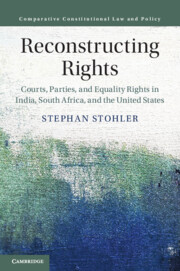 Reconstructing Rights
Reconstructing Rights 1 - The Politics of Legal Interpretation
from Part I - Introduction
Published online by Cambridge University Press: 09 July 2019
Summary
I use a puzzling episode of judicial interpretation from South Africa to motivate the theoretical question about why judges sometimes alter their commitments to some legal interpretations but not others. I examine existing scholarship, which tends to portray judges as behaving in four distinct ways when engaged in legal interpretation: as guardians; as principled interpreters; as regime partners; or as strategic interpretors or deliberators. I argue that each of these portrayals falls short in explaining judges' shifting commitments to legal interpretation. Instead, I argue that judges are best understood as behaving as deliberative partners by combining key theoretical aspects of existing work into a novel theoretical position. I then outline the unique observable implications of each position and propose a fair test that examines judicial behavior in response to political parties' shifting stances on equality rights during key moments in Indian, South African, and American history.
Keywords
- Type
- Chapter
- Information
- Reconstructing RightsCourts, Parties, and Equality Rights in India, South Africa, and the United States, pp. 3 - 28Publisher: Cambridge University PressPrint publication year: 2019
